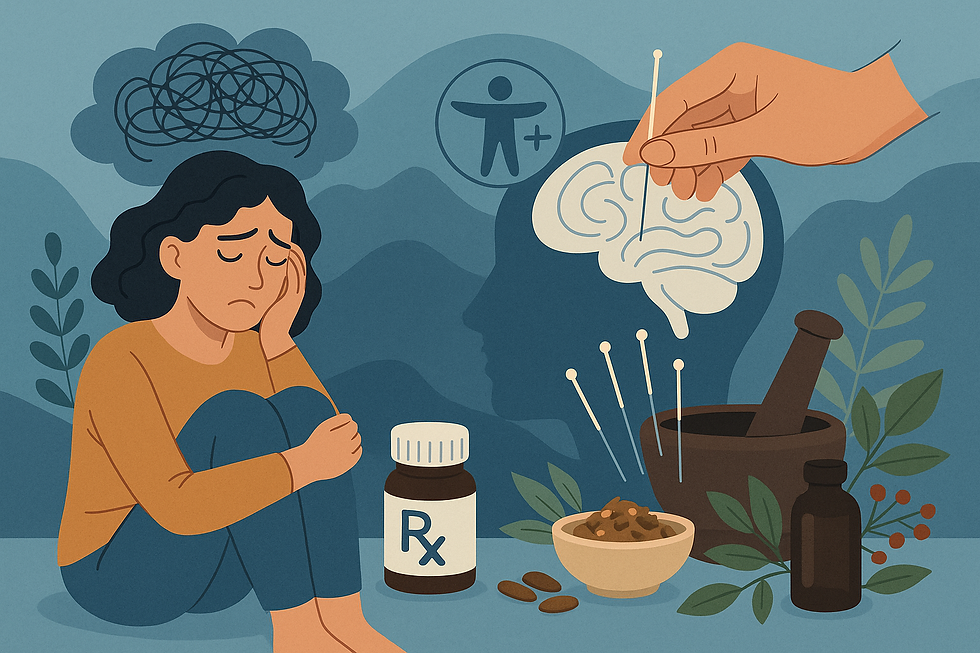Can Acupuncture and Chinese Medicine Help with Anxiety? A TCM Doctor Explains the Benefits
- Lucia Iadinardi

- Aug 7, 2025
- 5 min read
By Dr. Lucia Iadinardi DAOM, LAc.

A Growing Need for Holistic Anxiety Care
Anxiety is one of the most common mental health challenges in the modern world, and it can deeply affect a person’s physical, emotional, and social well-being. While Western medicine often focuses on symptom management through medication and psychotherapy, Traditional Chinese Medicine (TCM) offers a unique, holistic perspective that addresses both the root and branch of anxiety - the underlying imbalances and their outward manifestations.
This article examines the understanding of anxiety in both Western and Chinese medicine.
Whether used alone or in conjunction with psychotherapy and conventional treatments, TCM can provide valuable support for those seeking relief from anxiety symptoms. As a TCM practitioner, my goal is to help patients understand how ancient healing principles can bring balance, resilience, and calm into their modern lives.
Although TCM can be beneficial, this article is not intended to discourage anyone from seeking medical or psychological care. It would be irresponsible to suggest that TCM alone is appropriate for all cases, especially for individuals experiencing severe anxiety or those with complex underlying health or psychiatric conditions.
When Normal Worry Becomes a Disorder
Anxiety is a normal and natural response to stress, designed to help us stay alert and respond to danger. However, when anxiety becomes persistent, disproportionate to the actual threat, or begins to interfere with daily functioning, it may signal an anxiety disorder.
According to the Diagnostic and Statistical Manual of Mental Disorders, Fifth Edition (DSM-5), anxiety disorders are marked by excessive fear or anxiety that is difficult to control and causes clinically significant distress or impairment in social, occupational, or other important areas of life. To meet the diagnostic criteria, symptoms typically persist for six months or more.¹
Common Signs and Symptoms of Anxiety
Common symptoms of anxiety disorders include
Excessive and uncontrollable worrying - Restlessness or muscle tension
Difficulty sleeping
Fatigue or difficulty concentrating
Rapid heartbeat or shortness of breath
Gastrointestinal discomfort
Avoidance of anxiety-provoking situations
The DSM-5 outlines several specific anxiety disorders:
Generalized Anxiety Disorder (GAD)
Panic Disorder
Social Anxiety Disorder
Specific Phobias
Agoraphobia
Separation Anxiety Disorder
Selective Mutism
Treatment in Western medicine often involves a multimodal approach, including:
Psychotherapy, such as Cognitive Behavioral Therapy (CBT)
Medications, like selective serotonin reuptake inhibitors (SSRIs), serotonin-
norepinephrine reuptake inhibitors (SNRIs), or short-term anxiolytics
Lifestyle changes, including regular physical activity, sleep hygiene, and mindfulness-
based practices
How Common Is Anxiety?
Global and U.S. Prevalence Rates Anxiety disorders are among the most widespread mental health conditions worldwide, affecting
people of all ages, genders, and backgrounds. Globally, approximately 4% of the population
suffers from an anxiety disorder at any given time - equating to roughly 301 million people in
2019.² In the United States, about 19.1% of adults experience an anxiety disorder each year, and an estimated 31.1% will be affected at some point during their lifetime.²
Why Anxiety Affects More Women Than Men?
Women are significantly more likely than men to experience anxiety disorders. In the U.S.,
30.5% of women report a lifetime diagnosis, compared to 19.2% of men, making women 1.7 to 1.8 times more likely to meet diagnostic criteria within a given year.³ This disparity is
believed to result from a combination of biological, hormonal, neurological, and sociocultural factors. Neurological studies suggest that women have stronger anticipatory responses to perceived threats, which can heighten emotional memory and increase vulnerability to anxiety. Hormonal differences, particularly fluctuations in estrogen and progesterone, may also contribute to increased sensitivity to stress. Socially, women are often exposed to greater caregiving responsibilities, workplace stress, and cultural expectations - all of which may lead to chronic emotional strain. Additionally, societal norms make women more likely to report symptoms and seek help, while men may be less likely to do so due to stigma around emotional expression.⁴
Anxiety in Children and Adolescents
Rising Rates and Awareness

Anxiety is not limited to adults. Children and teens are increasingly affected - whether due to academic pressures, social challenges, or broader societal stressors. Recent estimates suggest that 9.4% of children aged 3–17 in the U.S. have diagnosed anxiety.⁵ Among teens, nearly 1 in 3 (30%) meet the criteria for an anxiety disorder, with the prevalence of Generalized Anxiety Disorder (GAD) and Social Anxiety Disorder on the rise.
Experts debate whether these numbers reflect a true increase in anxiety or improvements in
awareness, diagnosis, and screening practices. Most agree that while access to care has
improved, modern stressors (including social media exposure, bullying, and academic
competition) may contribute to heightened anxiety in youth.
Early diagnosis and intervention - including integrative care options like TCM can help
prevent chronic anxiety from affecting long-term development.
Anxiety Through the Lens of Traditional Chinese Medicine (TCM)
Mind-Body Balance in Chinese Medicine
Traditional Chinese Medicine (TCM) takes a holistic approach to health, viewing the mind and body as interconnected. Anxiety is not seen as a standalone mental illness but rather as a manifestation of internal disharmony affecting the flow of Qi (vital energy), Blood, and the
function of specific organ systems.
Organ Systems Involved in Anxiety:
From a TCM perspective, anxiety may stem from imbalances in one or more of the following systems:
Heart (Xin) – governs the mind (Shen); disturbances may lead to restlessness, insomnia,
palpitations, and excessive worry.
Spleen (Pi) – responsible for transforming food into Qi and Blood; deficiency can result
in overthinking, fatigue, and poor concentration.
Liver (Gan) – ensures the smooth flow of Qi; stagnation can manifest as irritability,
mood swings, or a sense of being emotionally “stuck.”
Kidneys (Shen) – store the body’s essence (Jing) and anchor the mind; deficiency may
lead to fearfulness, insecurity, and chronic anxiety.
Common TCM Patterns of Anxiety
Anxiety is often described using patterns or syndromes such as:
Heart and Spleen Qi Deficiency
Liver Qi Stagnation transforming into Heat
Phlegm disturbing the Heart
Kidney and Heart Disharmony
Each patient has a unique pattern of disharmony, which is why diagnosis in TCM depends on
individualized pattern differentiation. Treatment is customized to the person, not just the
symptoms.
Restoring Harmony: TCM Treatment Approaches
Rather than suppressing anxiety, the goal of TCM is to restore internal balance by addressing the root cause. This may involve:
Acupuncture to regulate the nervous system and move stagnant Qi
Herbal medicine to nourish deficiencies or clear Heat
Dietary therapy to support digestion and Spleen function
Qi Gong and Tai Chi to harmonize the body and mind
Pediatric Anxiety and TCM
Traditional Chinese Medicine is also used to support children and adolescents struggling with anxiety. Treatments are gentle and tailored to the child’s constitution, including acupuncture, acupressure, laser acupuncture, Shonishin (Japanese pediatric massage tools), herbal formulas, and dietary adjustments. These approaches aim to calm the mind, support digestion, and strengthen the Spleen and Heart. Early intervention through TCM can promote emotional resilience and help restore balance during critical developmental years.
In both acute and chronic cases, TCM can be used on its own or as a complement to Western psychotherapy and medication, helping patients regain calm, clarity, and resilience.
If you or someone you care about is experiencing anxiety, know that you’re not alone. Traditional Chinese Medicine offers a supportive and individualized approach. Whether used on its own or alongside other forms of care, acupuncture and herbal medicine can help calm the nervous system, ease emotional tension, and restore balance.
If you’d like to explore whether Chinese medicine might be a good fit for you, I welcome you to reach out to learn more or schedule a consultation.
Warmly,
Dr. Lucia Iadinardi, DAOM, LAc.
Doctor of Acupuncture and Oriental Medicine
References
1. American Psychiatric Association. Diagnostic and Statistical Manual of Mental
Disorders, 5th ed. Arlington, VA: American Psychiatric Publishing; 2013.
2. World Health Organization. Anxiety disorders. Published March 27, 2023. Accessed July
3. McLean CP, Asnaani A, Litz BT, Hofmann SG. Gender differences in anxiety disorders:
prevalence, course of illness, comorbidity and burden of illness. J Psychiatr Res.
2011;45(8):1027–1035. doi:10.1016/j.jpsychires.2011.03.006
4. Texas Health Resources. How Anxiety Affects Men and Women Differently.
Affects-Men-and-Women-Differently. Accessed July 30, 2025.
5. Centers for Disease Control and Prevention. Children’s Mental Health. Updated March
22, 2022. Accessed July 30, 2025. https://www.cdc.gov/childrensmentalhealth/data.html




Comments